Affiliate links on Android Authority may earn us a commission. Learn more.
Google Pixel 9, Pixel 9 Pro, and Pixel 9 Pro XL are here: Specs, price, colors, everything else!
Published onApril 1, 2025
The Google Pixel 8 series was the company’s best flagship series to date when it debuted in 2023, topping lists for some of the best Android phones you can buy. But the Pixel 9 series takes things up a notch. For the first time, this generation’s lineup comes with four models, namely the Pixel 9, Pixel 9 Pro, Pixel 9 Pro XL, and Pixel 9 Pro Fold.
In this extensive guide, we’ll go over what’s new with the vanilla version, Pro, and Pro XL — check out our dedicated Pixel 9 Pro Fold hub for more information on Google’s new foldable. Without further ado, let’s jump right in and discuss everything you need to know about the Google Pixel 9 series!
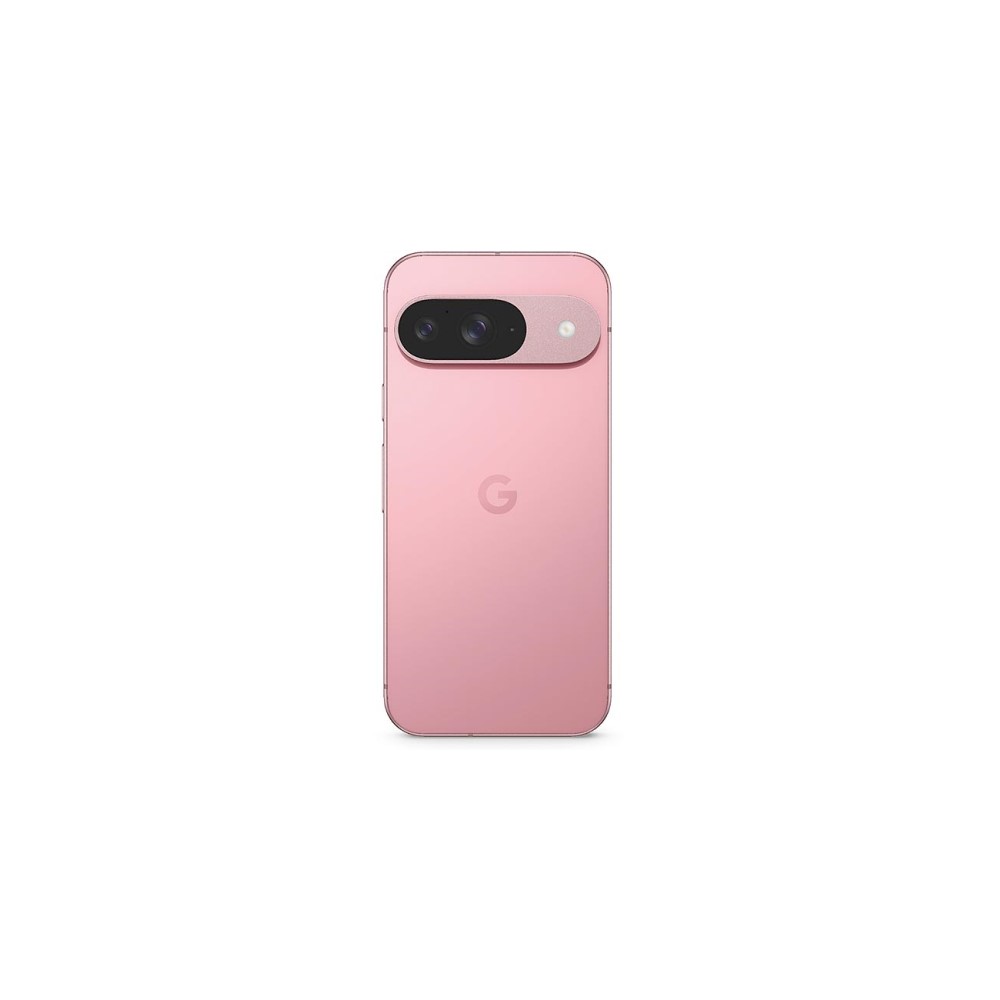
Excellent build quality, refined design
Extensive update policy

Excellent build quality
Flexible, capable cameras
Reliable update commitment

Gorgeous display
Seven years of software updates
Google Pixel 9, Pixel 9 Pro, and Pixel 9 Pro XL: Release date, price, and availability
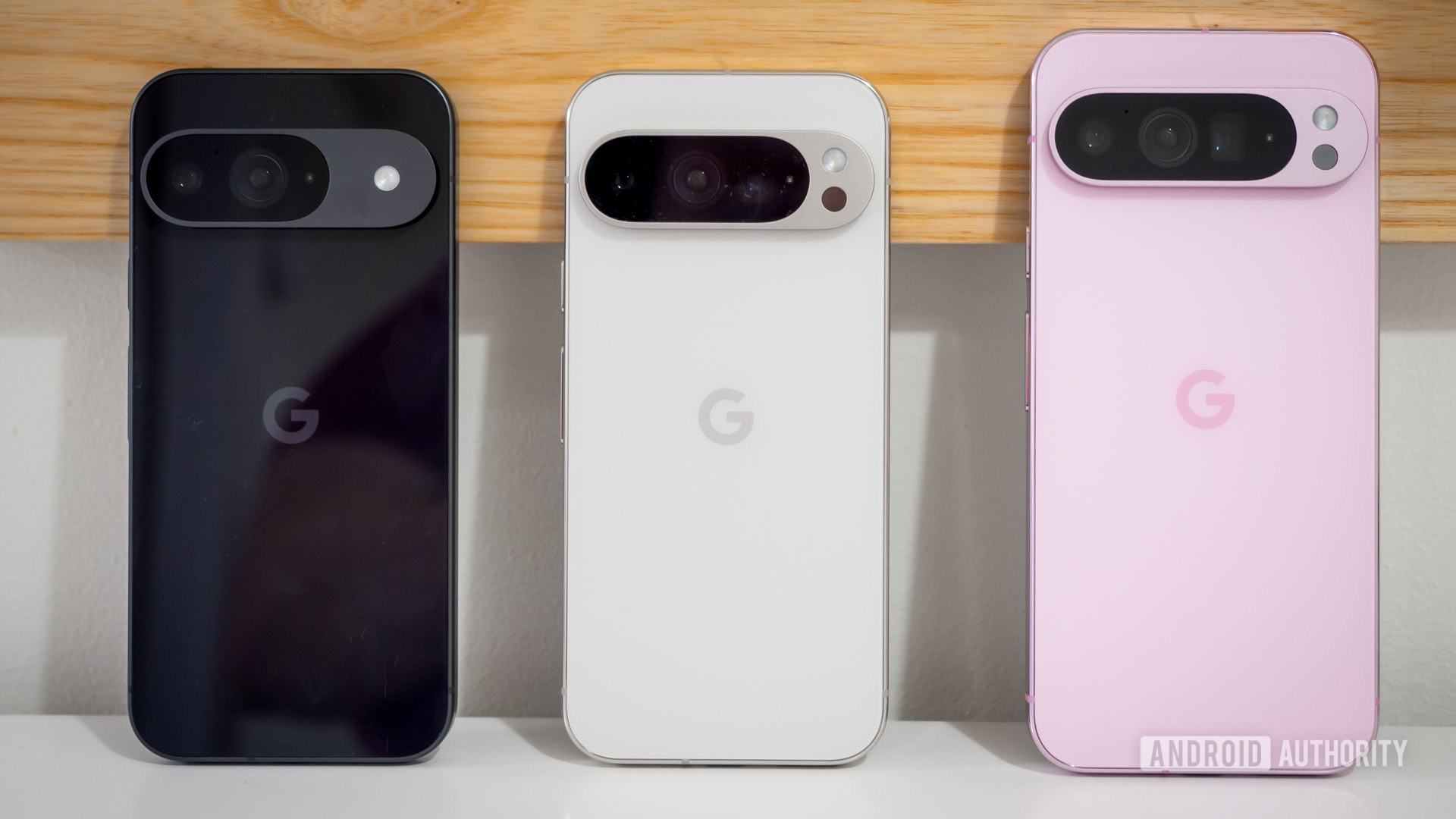
- Google Pixel 9 (128GB): $799 / £799
- Google Pixel 9 (256GB): $899 / £899
- Google Pixel 9 Pro (128GB): $999 / £999
- Google Pixel 9 Pro (256GB): $1,099 / £1,099
- Google Pixel 9 Pro (512GB): $1,219 / £1,219
- Google Pixel 9 Pro (1TB): $1,499 / £1,449
- Google Pixel 9 Pro XL (128GB): $1,099 / £1,099
- Google Pixel 9 Pro XL (256GB): $1,199 / £1,199
- Google Pixel 9 Pro XL (512GB): $1,319 / £1,319
- Google Pixel 9 Pro XL (1TB): $1,549 / £1,549
Google let it be known weeks in advance that it would launch the Pixel 9 series on August 13, 2024, and it followed through on that schedule. As always, the launch was part of Google’s annual Made by Google event, which took place at the company’s Mountain View headquarters.
Initially, the Pixel line made a name for itself by offering a flagship-level device at a surprisingly affordable price. Unfortunately, slowly and steadily, these handsets have been getting increasingly expensive. In 2023, Google raised the prices of the Pixel line by $100. It has once again raised prices, but this time, only for the base model. The Pixel 9, 9 Pro, and the new 9 Pro XL start at $799, $999, and $1,099, respectively. Depending on where you purchase the XL, you may be able to get it at a lower price.


While pre-orders have opened, you’ll have to wait for on-shelf availability. In the US, the Pixel 9 and Pixel 9 Pro XL will hit store shelves on August 22. The wait will be a little longer for the Pixel 9 Pro rollout, which is scheduled to be generally available sometime in September.
The Pixel 9 series is available in all the usual markets where Pixel phones are sold. That includes the United States (including Puerto Rico), Canada, Austria, Belgium, Czech Republic, Denmark, Finland, France, Estonia, Germany, Hungary, Ireland, Italy, Latvia, Lithuania, Netherlands, Norway, Poland, Portugal, Romania, Slovakia, Slovenia, Spain, Switzerland, Sweden, the United Kingdom, Australia, India, Japan, Malaysia, Singapore, and Taiwan.




Google Pixel 9, Pixel 9 Pro, and Pixel 9 Pro XL: Specs
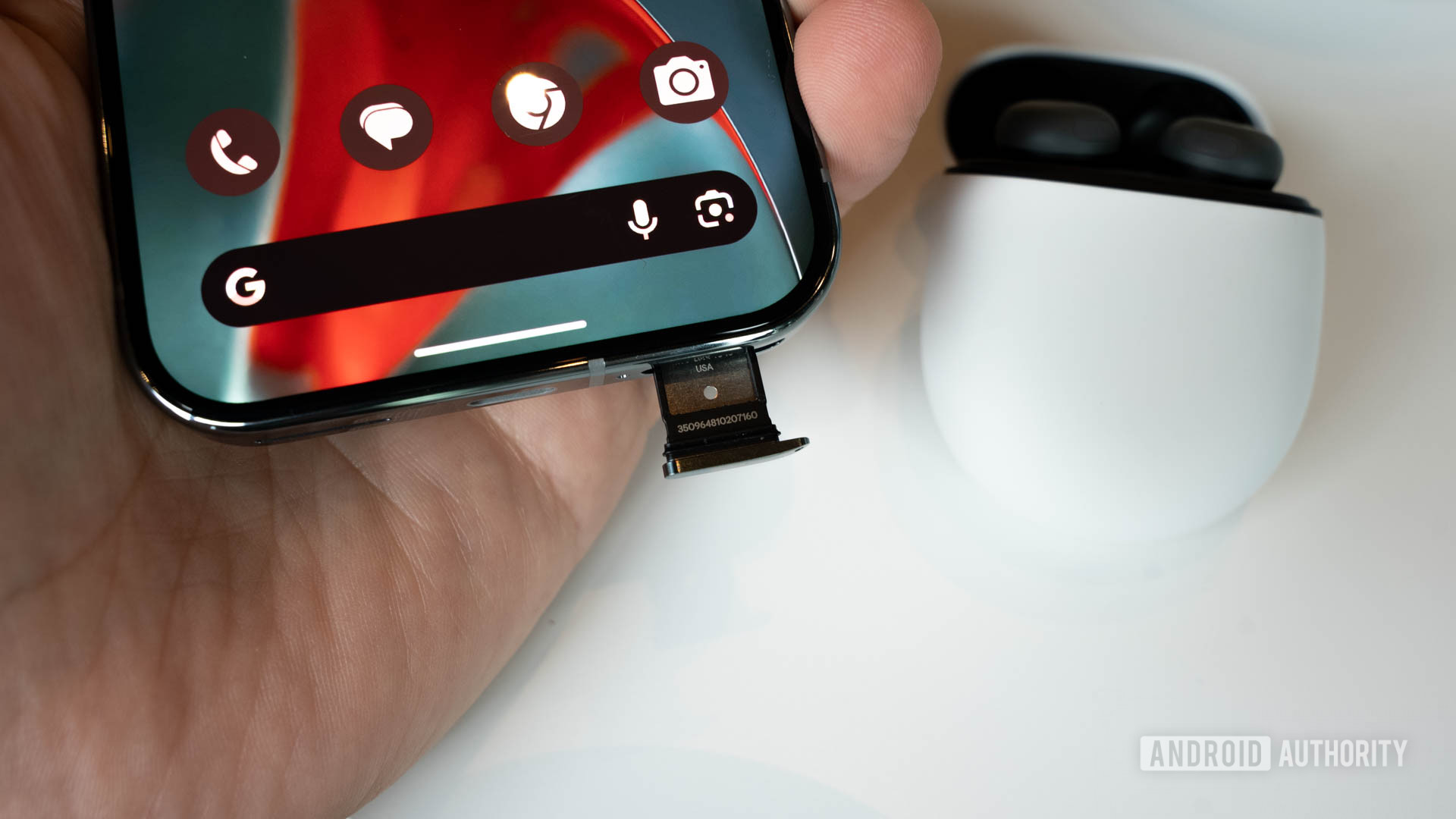
If you’re looking for a generational leap, the Pixel 9 series was given a handful of notable improvements over its predecessor. This includes factors like the display size, processor, battery, charging speeds, and so on. To get a sense of how it stacks up to the previous generation, be sure to check out our Pixel 8 vs Pixel 9 comparison.
As for how each Pixel 9 device compares to one another, here’s a full spec sheet offering every detail you need to know:
| Pixel 9 | Pixel 9 Pro | Pixel 9 Pro XL | |
|---|---|---|---|
Display | Pixel 9 6.3-inch OLED, 1,080 x 2,424 resolution, 422 PPI, 60-120Hz refresh rate, 20:9 aspect ratio, 2,700 nits peak brightness | Pixel 9 Pro 6.3-inch LTPO OLED, 1,280 x 2,856 resolution, 495 PPI, 1-120Hz refresh rate, 20:9 aspect ratio, 3,000 nits peak brightness | Pixel 9 Pro XL 6.8-inch LTPO OLED, 1,344 x 2,992 resolution, 486 PPI, 1-120Hz refresh rate, 20:9 aspect ratio, 3,000 nits peak brightness |
Processor | Pixel 9 Tensor G4 | Pixel 9 Pro Tensor G4 | Pixel 9 Pro XL Tensor G4 |
RAM | Pixel 9 12GB | Pixel 9 Pro 16GB | Pixel 9 Pro XL 16GB |
Storage | Pixel 9 128GB / 256GB | Pixel 9 Pro 128GB / 256GB / 512GB / 1TB | Pixel 9 Pro XL 128GB / 256GB / 512GB / 1TB |
Battery | Pixel 9 4,700mAh | Pixel 9 Pro 4,700mAh | Pixel 9 Pro XL 5,060mAh |
Power | Pixel 9 27W wired charging Wireless charging Battery Share | Pixel 9 Pro 27W wired charging Wireless charging Battery Share | Pixel 9 Pro XL 37W wired charging Wireless charging Battery Share |
Cameras | Pixel 9 Rear: - 50MP wide camera, ƒ/1.68, 82-degree FoV, 1/1.31" sensor - 48MP ultrawide camera, ƒ/1.7, 123-degree FoV, 1/2.55" sensor Front: 10.5MP, ƒ/2.2, 95-degree FoV | Pixel 9 Pro Rear: - 50MP wide camera, ƒ/1.68, 82-degree FoV, 1/1.31" sensor - 48MP ultrawide camera, ƒ/1.7, 123-degree FoV, 1/2.55" sensor - 48MP telephoto camera, ƒ/2.8, 22-degree FoV, 5x optical zoom, 1/2.55" sensor Front: 42MP, ƒ/2.2, 103-degree FoV | Pixel 9 Pro XL Rear: - 50MP wide camera, ƒ/1.68, 82-degree FoV, 1/1.31" sensor - 48MP ultrawide camera, ƒ/1.7, 123-degree FoV, 1/2.55" sensor - 48MP telephoto camera, ƒ/2.8, 22-degree FoV, 5x optical zoom, 1/2.55" sensor Front: 42MP, ƒ/2.2, 103-degree FoV |
Video | Pixel 9 Rear: 4K (24/30/60 FPS) 1080p (24/30/60 FPS) Front: 4K (30/60 FPS) | Pixel 9 Pro Rear: 4K (24/30/60 FPS) 1080p (24/30/60 FPS) Front: 4K (30/60 FPS) | Pixel 9 Pro XL Rear: 4K (24/30/60 FPS) 1080p (24/30/60 FPS) Front: 4K (30/60 FPS) |
Connectivity | Pixel 9 5G (mmWave + Sub6) Wi-Fi 7 (802.11/be) Bluetooth 5.3 (dual antenna) | Pixel 9 Pro 5G (mmWave + Sub6) Wi-Fi 7 (802.11/be) Bluetooth 5.3 (dual antenna) Ultra-wideband chip | Pixel 9 Pro XL 5G (mmWave + Sub6) Wi-Fi 7 (802.11/be) Bluetooth 5.3 (dual antenna) Ultra-wideband chip |
SIM | Pixel 9 Dual SIM (Single Nano SIM and eSIM) | Pixel 9 Pro Dual SIM (Single Nano SIM and eSIM) | Pixel 9 Pro XL Dual SIM (Single Nano SIM and eSIM) |
Security | Pixel 9 Face Unlock (Class 3) Ultrasonic under-display fingerprint sensor Titan M2 chip | Pixel 9 Pro Face Unlock (Class 3) Ultrasonic under-display fingerprint sensor Titan M2 chip | Pixel 9 Pro XL Face Unlock (Class 3) Ultrasonic under-display fingerprint sensor Titan M2 chip |
Durability | Pixel 9 IP68 Gorilla Glass Victus 2 | Pixel 9 Pro IP68 Gorilla Glass Victus 2 | Pixel 9 Pro XL IP68 Gorilla Glass Victus 2 |
Software | Pixel 9 Android 14 7 years of OS, security, and Pixel Drop updates | Pixel 9 Pro Android 14 7 years of OS, security, and Pixel Drop updates | Pixel 9 Pro XL Android 14 7 years of OS, security, and Pixel Drop updates |
Dimensions and weight | Pixel 9 152.8 x 72.0 x 8.5mm 198g | Pixel 9 Pro 152.8 x 72.0 x 8.5mm 199g | Pixel 9 Pro XL 162.8 x 76.6 x 8.5mm 221g |
Colors | Pixel 9 Obsidian Porcelain Wintergreen Peony | Pixel 9 Pro Obsidian Porcelain Hazel Rose Quartz | Pixel 9 Pro XL Obsidian Porcelain Hazel Rose Quartz |
Google Pixel 9, Pixel 9 Pro, and Pixel 9 Pro XL: Features
It wouldn’t be a new Pixel launch without a slate of hardware and software upgrades. But what exactly has changed between last year and now? Google has fitted these phones with a bevy of features and they’re slated to receive even more in future Pixel Feature Drops. But for now, let’s keep our focus on what you’re getting out of the box and in the near future.
Camera
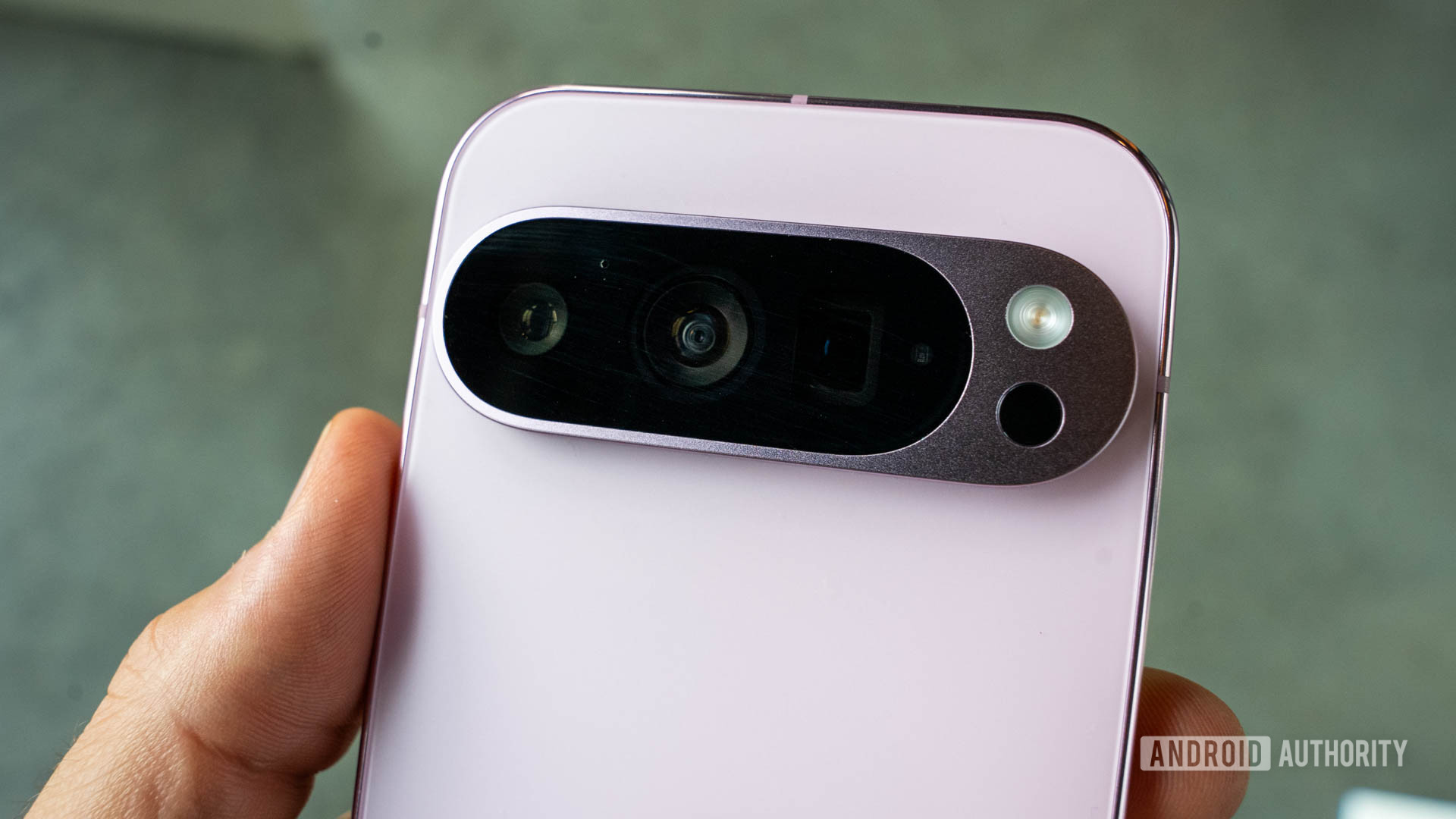
Since the Pixel series hangs its hat on photography, let’s first discuss the camera situation. Pixel phones are usually considered among the best camera phones money can buy. This is supported not only by the quality lenses sitting inside the camera bump, but also by the computational photography Google specializes in. Let’s get into the specifics, starting with the Pixel 9 and moving our way up.
The base model has a 50MP primary camera with Octa PD — an auto-focus method used for large-sized sensors to achieve high sensitivity and high resolution. It has the same aperture (ƒ/1.68), field of view (82 degrees), and sensor size (1/1.31 inches) as the Pixel 8. In addition, the front camera, which is a 10.5MP lens, is also recycled from last year’s model. But don’t expect the whole camera array to be a copy, as the ultrawide has been upgraded from 12MP to 48MP. This ultrawide lens has an aperture of ƒ/1.7, FoV of 123 degrees, and a 1/2.55-inch sensor.
The Pixel 9 series should continue Google's excellent track record for making top-tier camera phones.
Next, we have the Pixel 9 Pro that features a triple camera setup as it always has. That setup includes the same main and ultrawide cameras found in the entry model, but adds a 48MP telephoto to the mix with a ƒ/2.8 aperture, 22-degree FoV, and 1/2.55-inch sensor. However, we do get treated to an improved front camera. While the Pixel 8 Pro shared the same front camera as the Pixel 8, the Pixel 9 Pro jumps up from 10.5MP to 42MP with an ƒ/2.2 aperture and 103-degree ultrawide FoV. For the Pro XL, you’ll be getting the same camera equipment you get with the Pixel 9 Pro.
Performance
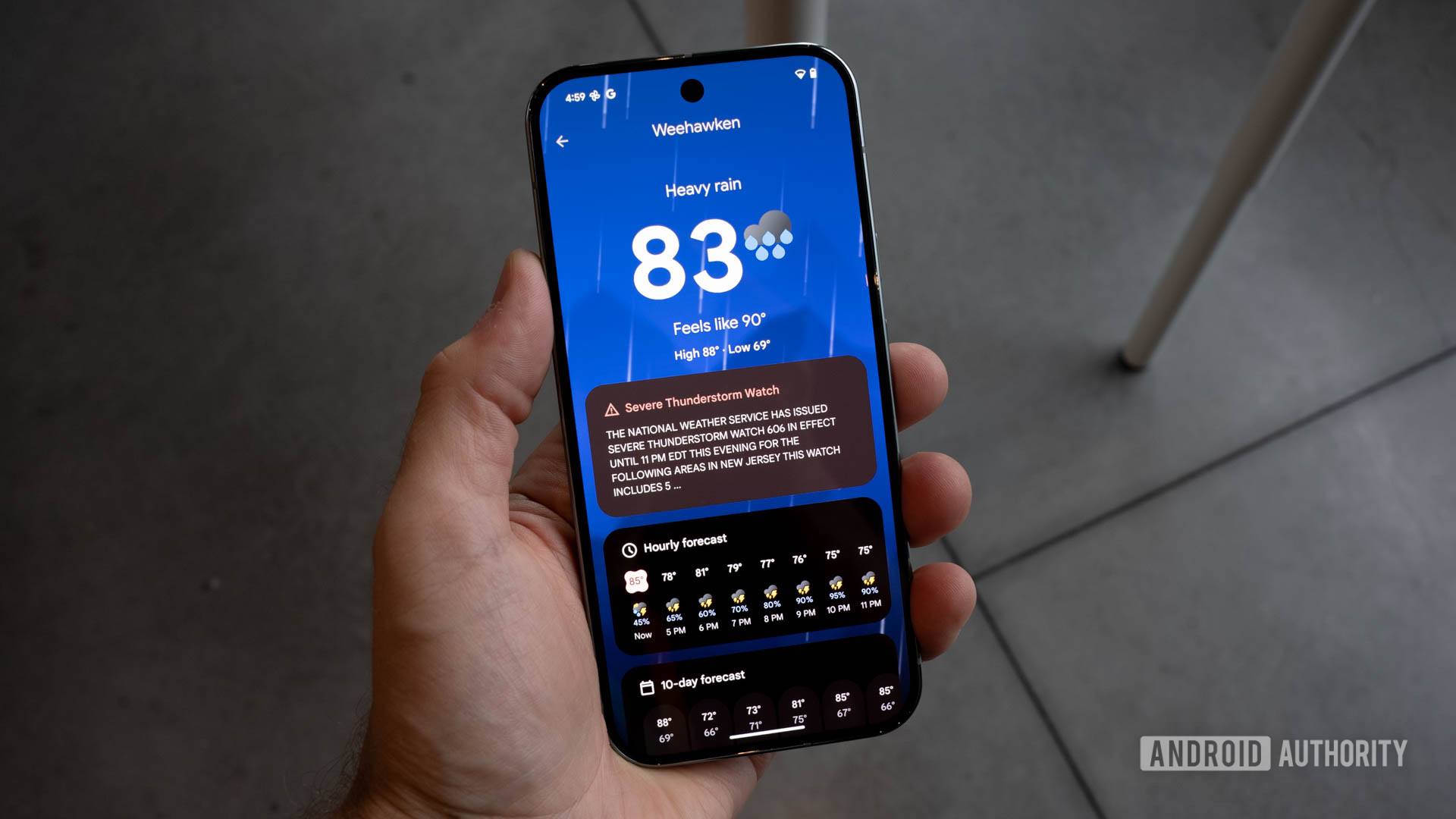
The Pixel 9 series marks the debut of Tensor G4, the latest Google-designed processor. If everything plays out the way it should, this is likely the final Tensor chipset based on Samsung’s Exynos design. It’s believed that the next Tensor SoC will be entirely created from scratch and based on a TSMC processor node. But we’re not here to talk about that right now, let’s focus our attention on Tensor G4.
As expected, Tensor G4 makes improvements across the board in terms of performance. For example, web browsing is 20% faster, app launches are 17% faster, and the phone is more efficient for everyday use cases like taking photos or streaming content.
To accomplish these feats, the chip has been fitted with a number of upgrades, such as the new Samsung Modem 5400. Compared to the Samsung Modem 5300 in the Pixel 8 series, this modem is faster and more power efficient. In addition, the Tensor G4 has a more conventional 4+3+1 arrangement than the Tensor G3’s 4+4+1 and uses newer ARMv9.2 cores from Arm (Cortex-A520, Cortex-A720, and Cortex-X4). These changes were made to help the unit run cooler and boost performance.
Moving on to RAM and storage, RAM has gone up while the storage configurations are the same as before. That means the vanilla Pixel 9 gets 128GB or 256GB of storage but is now paired with 12GB of RAM. The Pixel 9 Pro and Pro XL get 16GB of RAM with your choice of 128GB, 256GB, 512GB, or 1TB for storage.
If you’re wondering why RAM has been increased across the board, it likely has to do with Google’s AI features, as the technology can be rather demanding in the power department. As usual, storage is not expandable on the Pixel 9 series, so be sure to get the model with the most storage you can afford.
Screen quality and size
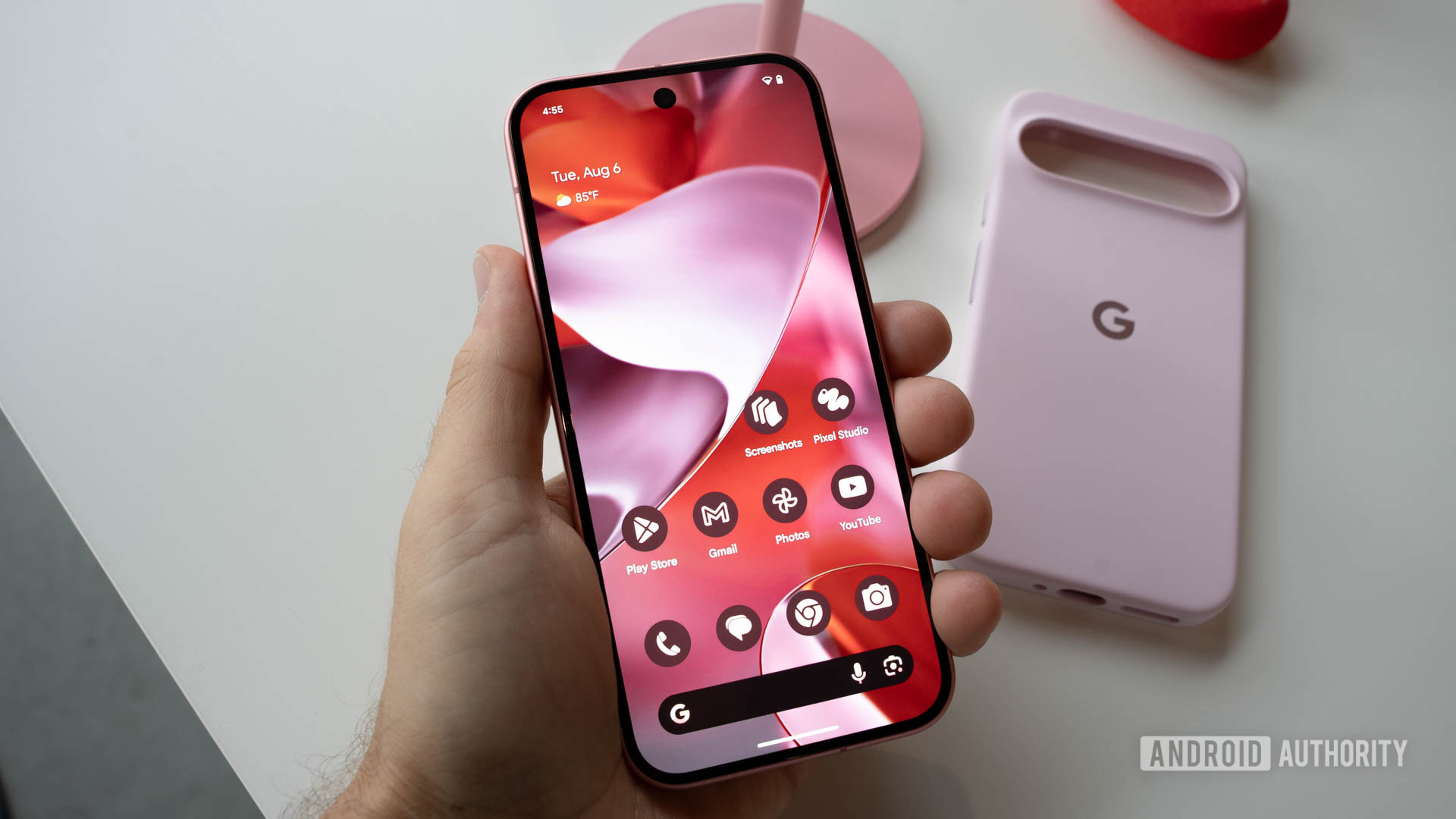
The Pixel 9 series is slightly larger than the last generation, which allowed Google to fit in larger displays this time around. These displays have a few advantages over last year’s lineup. Let’s get into the specifics of what’s different in 2024.
The Pixel 9 and Pixel 9 Pro have many similarities, but the display is one area where they differ. Focusing on the Pixel 9, the OLED screen has grown 0.1 inches from last year to 6.3-inch. This Actua panel has a pixel density of 422 PPI, a resolution of 2,424 x 1,080, and a 60-120Hz refresh rate. Other than the refresh rate, which is the same, these are all upgrades compared to its predecessor. It also manages to improve the brightness, being capable of reaching a peak of 2,700 nits.
Which Pixel 9 series model is the better buy?
The Pixel 9 Pro’s OLED display is also 6.3-inch, however, this handset uses an LTPO Super Actua screen. This means that Google’s phone can get very bright — peaking at 3,000 nits — without sacrificing color vividness or clarity. It is also capable of dropping its 120Hz frame rate down to 1Hz for viewing static content, which can help save battery life. Choosing this phone over the base model will also get you a better resolution at 2,856 x 1,280 and more pixel density (495 PPI).
Meanwhile, the Pixel 9 Pro XL sets itself apart from the rest with a 6.8-inch OLED LTPO Super Actua display. Interestingly, this display boasts a lower pixel density than the Pro model, at 486 PPI. However, you likely won’t notice the difference, especially given the fact that the panel has a higher resolution, at 2,992 x 1,344. Just like the Pro, it has 3,000 nits of brightness, and the refresh rate maxes out at 120Hz but can dip as low as 1Hz.
There is one thing that all three models share, and that is the aspect ratio. Just like in 2023, the new Pixel family has a 20:9 aspect ratio.
Design, colors, and build quality
This year, Google arguably made the biggest design change to the Pixel since the Pixel 6. While not as drastic, the 2024 model transforms the handset’s camera bar, which has become a defining feature for the line, into an oval-shaped camera pill. Furthermore, the squared-off edges used in previous generations have been sidelined for something a little more curvy, somewhat akin to the Pixel 8a. Along with the flat sides, the overall design appears to be inspired by Apple’s iPhone.
In terms of dimensions, there’s been a change in this area as well. When the Pixel 8 launched, it was smaller than the Pixel 7, but Google seems to have reversed course for the Pixel 9. The base and Pro models are slightly taller, wider, and less thick than the Pixel 8, measuring 152.8 x 72.0 x 8.5mm. This also means that the Pro version is smaller, slimmer, and less thick than the Pixel 8 Pro. However, there’s an almost negligible difference between the Pixel 8 Pro and the Pixel 9 Pro XL which comes in at 162.8 x 76.6 x 8.5mm.
The Pixel 9 series makes some big changes to the Pixel aesthetic.
Meanwhile, the flat display makes a return, as well as Gorilla Glass. The two biggest differences between this year and last year in terms of the panel are the increased screen sizes and now Gorilla Glass Victus 2 is applied across the line. Speaking of the screen sizes, the Pixel 9 and 9 Pro are now 6.3-inches and the Pro XL is 6.8-inches.
Moving our attention to the build quality, Gorilla Glass Victus 2 can be found on both the front and back of the hardware. On the vanilla model, the glass has a polished finish, while the 9 Pro and Pro XL sport a silky matte finish. You can also expect a water and dust resistance rating of IP68. Although all three phones up Google’s durability pedigree, you’ll want to snag a suitable case. Thankfully, there are plenty of Pixel 9 and Pixel 9 Pro cases, and the Pixel 9 Pro XL cases, too.
As for the colors, Google is offering an extra option for all three models, bringing the total colorways to four. Each model will get Obsidian (black) and Porcelain (white), but there will be a few model-specific colors. The Pixel 9 will be losing Rose (dull pink) and Hazel (light gray/greenish) from last year, which are being replaced by Wintergreen (light green) and Peony (reddish pink). Meanwhile, the Pro and Pro XL lose Bay (blue), but gain Hazel and Rose Quartz (light pink).
Battery life and charging speed
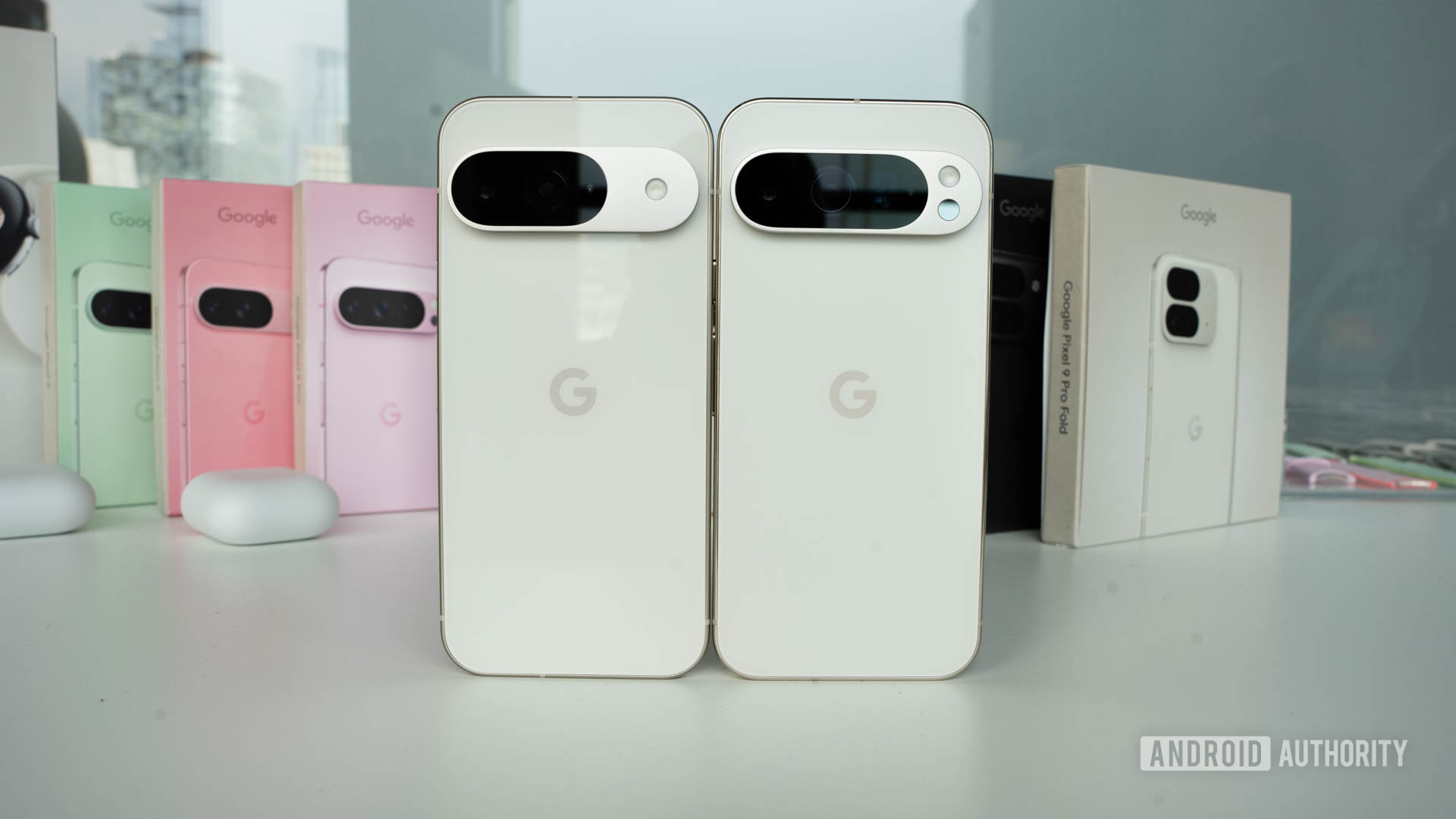
If you were hoping that Google would up the ante when it comes to the Pixel’s battery, you’ll be pleased to know the battery capacity has been increased. However, it may not be as big of a leap forward as you may have liked.
Starting with the Pixel 9, Google gave its entry-level handset a 4,700mAh battery. This means that the Pixel 9’s battery capacity is 125mAh higher than the Pixel 8’s 4,575mAh battery. While it is nice to see the increase, you probably won’t notice that much of a difference in real life. As far as charging is concerned, Google is still playing it safe with a 27W charging speed that can get you up to 55% full after 30 minutes.
Next, we have the Pixel 9 Pro, which actually gets a bit of a downgrade. Like the base model, the Pro comes with a 4,700mAh battery, down from last year’s 5,050mAh. This is likely due to the fact that the Pro has the same dimensions as the vanilla version. On top of that, the device also shares a charging speed of 27W.
The 9 Pro XL, on the other hand, has a build that’s more similar to last year’s 8 Pro. As such, this bigger phone comes with a larger 5,060mAh battery, a slight increase compared to the Pixel 8 Pro. For those wanting faster charging, this may be the Pixel you’ve been waiting for, given its 37W charging rate. In the span of 30 minutes, Google says your battery should gain 70% of its juice back.
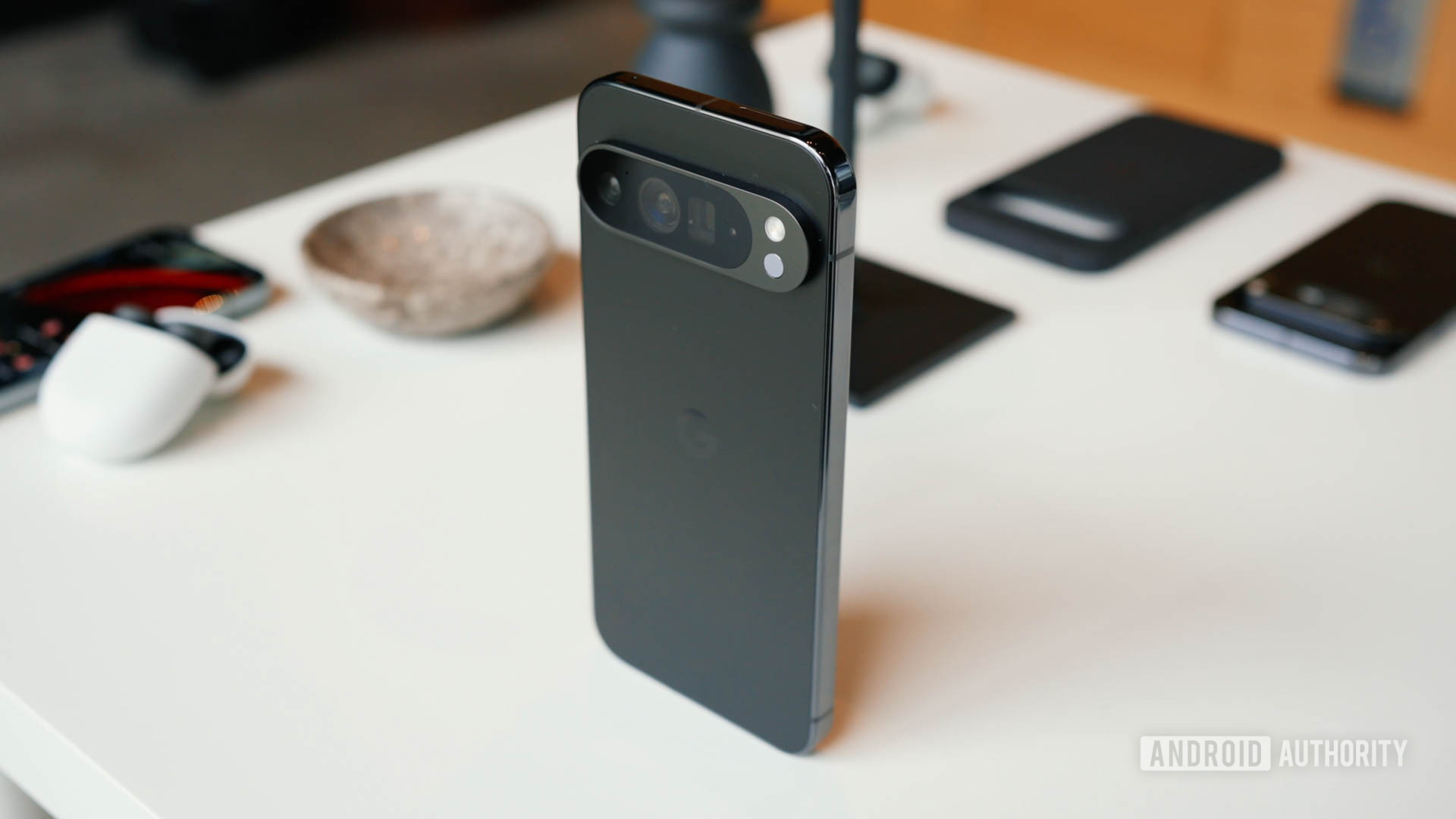
The tech giant didn’t forget about wireless charging. All three models are 12W Qi-certified, so your wireless charger will still work. If you have the 2nd generation Pixel Stand with you, you can get 15W wireless charging on the Pixel 9, 21W wireless on the Pixel 9 Pro, and 23W wireless charging on the Pixel 9 Pro XL.
Also returning is Battery Share, which allows you to use the phone’s battery to charge up other devices, such as the newly announced Pixel Buds Pro 2.
There’s no charger in the box for either of these phones, but Google is also launching a 45W charger that can be purchased separately for $29.99. This charger will be available in all markets where the Pixel is sold. Interestingly, the fastest charging speed on the Pixel 9 series is 37W. Of course, you don’t actually need Google’s official charger as any 40W+ USB Power Delivery PPS charger will do the job nicely — check out our best wall charger and best Google Pixel 9 charger recommendations if you need one.
Software and updates
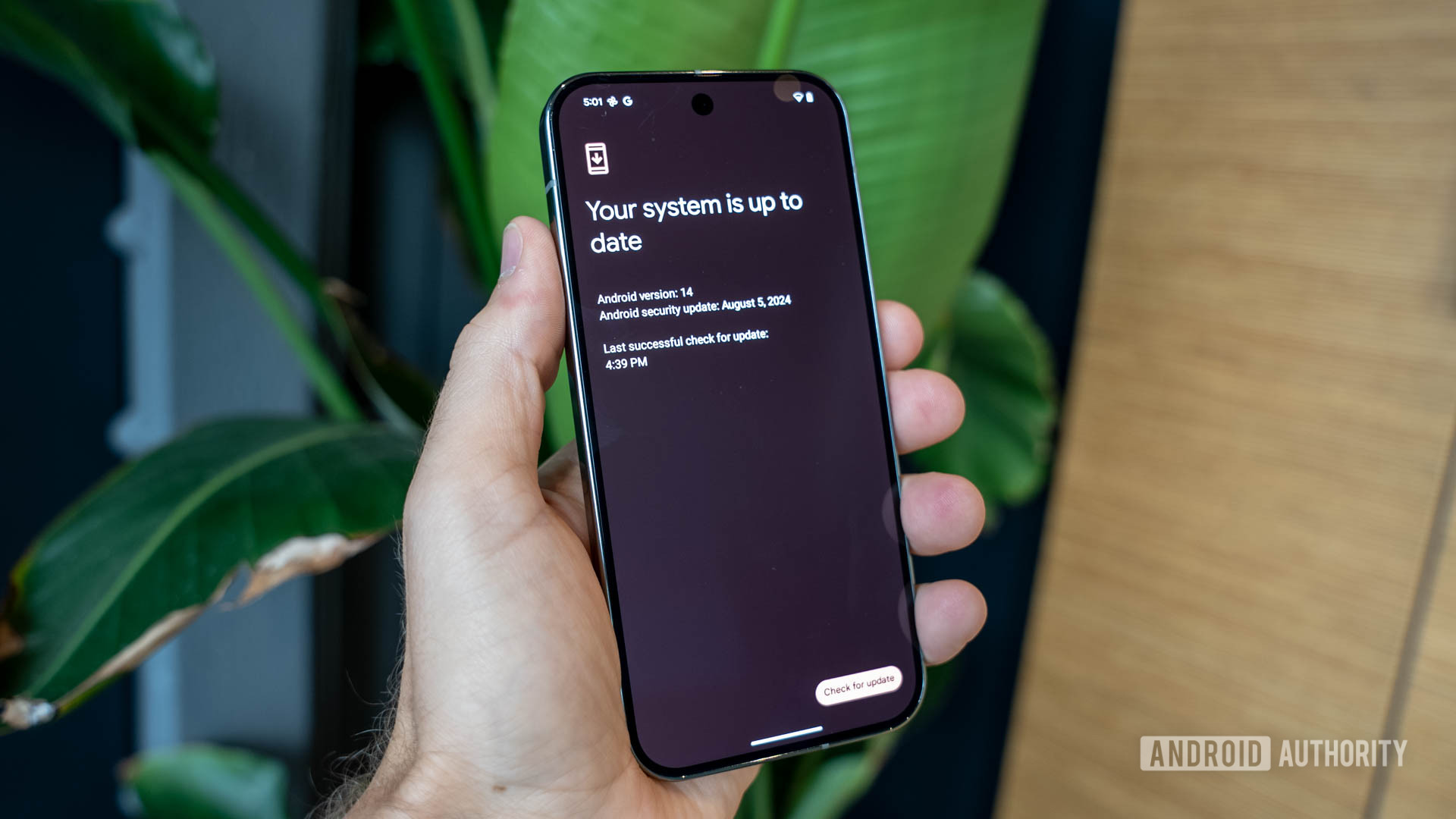
One of the biggest surprises of the Pixel 9 series launch was the realization that it is arriving with Android 14 and not Android 15. Until now, every new Pixel launch has coincided with the rollout of a new Android version. If you’re worried about whether this will count toward your major OS updates, you don’t need to be. Google’s update promise is linked to years, not a specific number.
Regarding Google’s update promise, every Pixel 9 model gets seven years of OS, security, and feature drop updates. This is the same number of years as promised for the Pixel 8 series, and it should still be plenty of support for most people.
On top of everything else, getting a Pixel 9 series will net you VPN by Google. This is a benefit you’ll be able to enjoy for free, regardless of what model you purchase.
FAQ
No, the Pixel 9, Pixel 9 Pro, nor the Pixel 9 Pro XL have microSD card slots. This is something Pixel phones have lacked for a long time.
No, the Pixel 9 series is not waterproof, but it is water-resistant with an IP68 rating. This means it can be submerged in water of up to 1.5m for up to 30 minutes, not indefinitely.
No. Like most phones these days, the Pixel line lost its headphone jack years ago and it hasn’t come back.